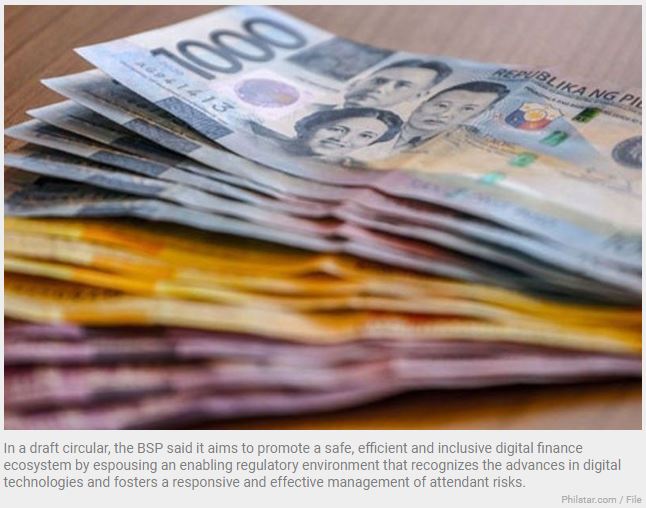Philippines: BSP tightens rules on e-money licenses
MANILA, Philippines — The Bangko Sentral ng Pilipinas (BSP) is tightening the guidelines for registration of banks and non-bank financial institutions venturing into electronic money services based on their size, complexity of operations and systemic importance.
In a draft circular, the BSP said it aims to promote a safe, efficient and inclusive digital finance ecosystem by espousing an enabling regulatory environment that recognizes the advances in digital technologies and fosters a responsive and effective management of attendant risks.
“This enables banks to provide financial services attuned to the evolving needs and behavior of consumers and supported by safeguards and controls against various existing and emerging risks, such as money laundering, terrorism and proliferation financing, cybersecurity and fraud, among others,” the BSP said.
Prior to the issuance of e-money, the central bank said electronic money issuer -banks and EMI non-bank financial institutions (EMI-NBFI) need to put in place sound and prudent management, administrative and accounting procedures and adequate internal control mechanisms.
Banks are also required to establish properly designed computer systems that are thoroughly and independently tested prior to implementation, appropriate security policies and measures intended to safeguard the integrity, authenticity, and confidentiality of data and operating processes, as well as due diligence and accreditation policy and process in selecting e-money agents and merchants or business partners.
Likewise, banks must put in place a fraud risk management system that is commensurate to the risks associated with particular EMI types or specific EMI activities, adequate business continuity and disaster recovery plan, as well as effective audit function to provide periodic review of the security control environment and critical systems.
Aside from consumer protection and interoperability of systems, the BSP is requiring EMI-banks and EMI-NBFIs issue pre-defined transaction limits and thresholds, while conducting enhanced due diligence for large value pay-outs of more than P500,000 in any single transaction that should be done through banks.
The BSP said EMI-banks should have sufficient liquidity assets to meet e-money redemptions at all times, but allocating at least 50 percent of outstanding e-money balance in a trust fund on behalf of account holders.
According to the central bank, the other half should be held in bank deposits specifically earmarked for liquidity requirements of the e-money balances, government securities and liquid assets allowed by the BSP.
In terms of capital requirements, large-scale EMI-banks or those with 12-month average transactions amounting to P25 billion are required to maintain a capitalization of P200 million, while small-scale EMI-banks are required to keep the level at P100 million.
The regulator warned that any entity or person found to be engaging in e-money operations without prior BSP approval shall be subject to appropriate enforcement actions, without prejudice to the pursuit of any legal action against the owners and operators of the entity.
Likewise, the BSP said that any authority to engage in e-money business shall automatically be revoked if the bank does not commence e-money operations within one year after receipt of the notice of approval of its EMI license application.
As of end-2021, the BSP has issued EMI licenses to 29 banks and 38 NBFIs.
Last November, the BSP announced that it was imposing a two-year moratorium on the issuance of licenses to NBFIs effective Dec. 16 last year to ensure that its resources are managed and mobilized judiciously in a manner that promotes financial stability and inclusive growth, as well as advances the development of innovative electronic money solutions that offer strong value propositions.
Under the Digital Payments Transformation Roadmap, the BSP aims to convert 50 percent of total retail transactions to electronic channels and increase the number of Filipino adults with bank accounts to 70 percent by 2023.
With the pandemic serving as catalyst, estimates showed the share of digital payments to total retail transactions increased to 30 percent last year from 20.1 percent in 2020, while 53 percent of Filipino adults now have bank accounts as of the first quarter of 2021, from 29 percent in 2019.
Source: https://www.philstar.com/business/2022/03/03/2164483/bsp-tightens-rules-e-money-licenses


 Thailand
Thailand




